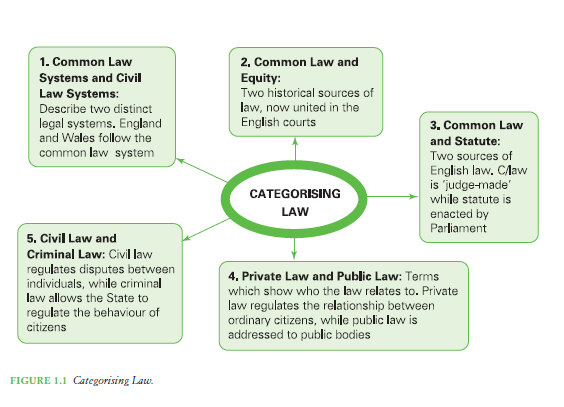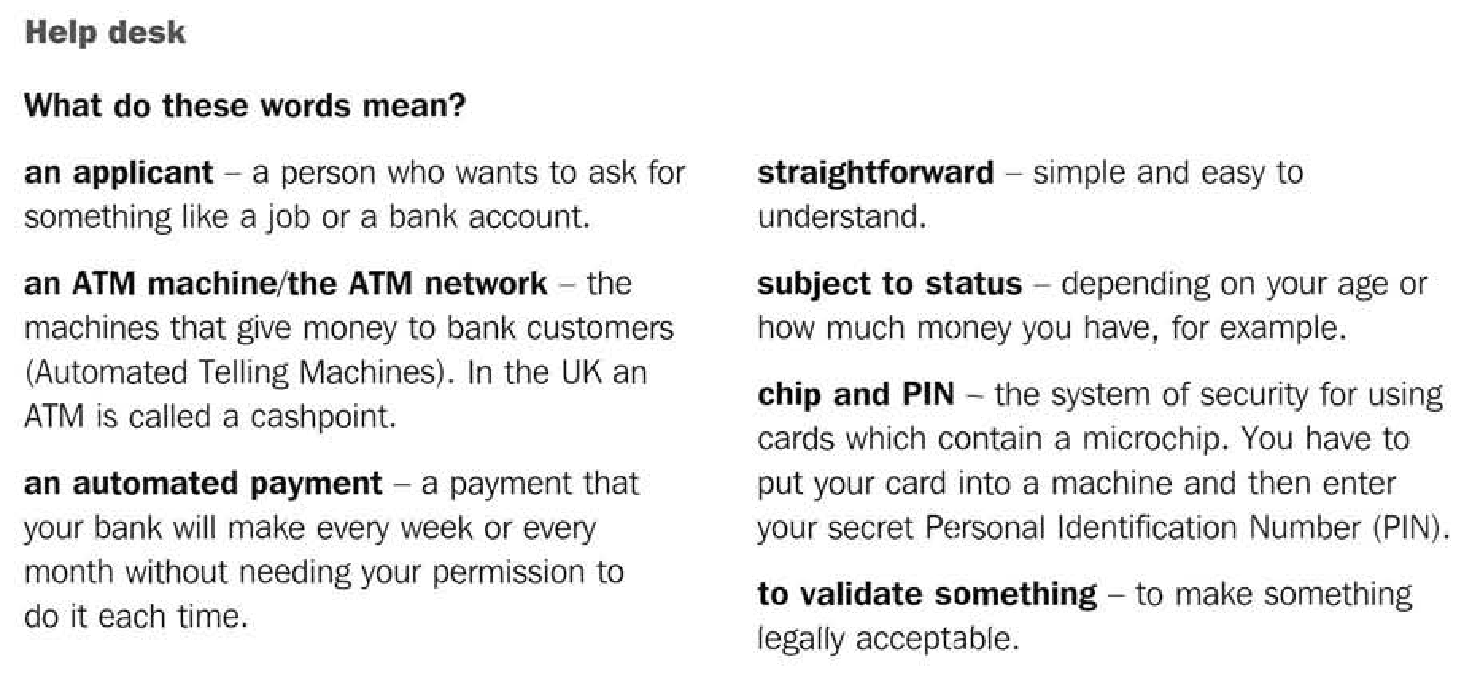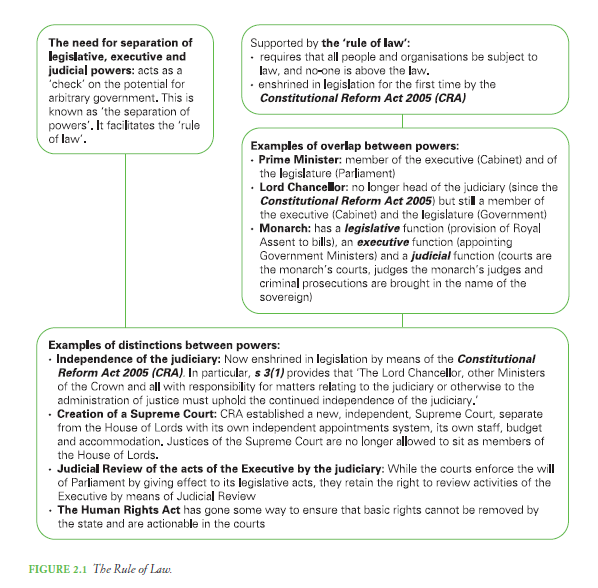
- •Тема: «Некоторые особенности юридической терминологии и лексики в рамках судопроизводства»
- •Annotation
- •Contents
- •Introduction
- •Chapter 1. Law and legal study §1. Categories Of Law
- •§2. Human rights
- •§3. The English Legal system
- •Chapter 2. Language in law §1 Linguistic prosecution
- •§2. Features of documents
- •Chapter 3. Investigation §1. Books for studying
- •§2. Attorney’s Conclusion Argument
- •§3. Linguistic investigation
- •Conclusion
- •References
- •Appendics
- •1St tape
1St tape
P Did you hide?
(18) Yes I hid for a while and then I heard the bang I have told you about.
P What were the others doing?
(20) The three of them were still in the room.
P What were they doing?
(21) They all looked shocked and as I remember, but I can't be sure,were shouting at each other.
P Who said what?
(22) Jimmy said that it was an accident, or like this.
P Did you see any injury to the boy?
(24) Yes sir, in the head.
P What happened then?
(25) I felt sick.
Pic. 1. Categories of law

Pic 2. Word dictionary example

Pic. 3. Exercise for students example

Pic. 4. Rule of law
Addition 1
English legal glossary
ACTION - Case, cause, suit, or controversy disputed or contested before a court of justice.
ADJUDICATE - To determine finally.
ADJUDICATION - Giving or pronouncing a judgment or decree. Also the judgment given.
ADMINISTRATOR - 1. One who administers the estate of a person who dies without a will. 2. A court official.
ADMISSIBLE - Pertinent and proper to be considered in reaching a decision.
ADMISSIBLE EVIDENCE - Evidence that can be legally and properly introduced in a civil or criminal trial.
ADMISSION - Voluntary acknowledgment of the existence of certain facts relevant to the adversary's case.
ADMONISH - To advise or caution. For example the Court may caution or admonish counsel for wrong practices.
AGREED STATEMENT OF FACTS - A statement of all important facts, which all the parties agree is true and correct, which is submitted to a court for ruling.
AGREEMENT - A mutual understanding and intention between two or more parties. The writing or instrument which is evidence of an agreement. (Although often used as synonymous with contract, agreement is a broader term.)
AID AND ABET - Help, assist, or facilitate the commission of a crime.
ALFORD PLEA - A special type of guilty plea by which a defendant does not admit guilt but concedes that the State has sufficient evidence to convict; normally made to avoid the threat of greater punishment. Source: Black's Law Dictionary
(1996); North Carolina v. Alford , 400 U.S. 25 (1970).
ALIBI - A defense claim that the accused was somewhere else at the time a crime was committed.
ALIMONY - A court-ordered allowance that one spouse pays the other spouse for maintenance and support while they are either separated, pending suit for divorce, or after they are divorced.
ALLEGATION - The assertion of a party to an action, setting out what he expects to prove.
ARBITRATION - The referral of a dispute to an impartial third person chosen by the parties to the dispute who agree in advance to abide by the arbitrator's award issued after a hearing at which both parties have an opportunity to be heard.
ARGUMENT - Remarks addressed by attorney to judge or jury on the merits of case or on points of law.
ARRAIGN - The procedure where the accused is brought before the court to hear the criminal charge(s) against him or her
and to enter a plea of either guilty, not guilty or no contest.
ARRAIGNMENT - A proceeding in which the accused is brought before the court to plead to the criminal charge in the
indictment or information. The charge is read to him or her and he or she is asked to plead guilty or not guilty or, where
permitted, nolo contendere (no contest). Another term for preliminary hearing.
ARREST - To deprive a person of his liberty by legal authority.
ARREST OF JUDGMENT - Postponing the effect of a judgment already entered, ordinarily because of an error apparent on
the record .
CAPITAL CRIME - A crime punishable by death.
CAPITAL PUNISHMENT - Punishment by death for capital crimes. Death penalty .
CAPTION - The heading on a legal document listing the parties, the court, the case number, and related information.
CASE - A general term for an action, cause, suit, or controversy brought before the court for resolution.
CASE LAW - Law established by previous decisions of appellate courts, particularly the Supreme Court.
CASE NUMBER - See DOCKET NUMBER.
CAUSATION - The act which produces an effect.
CAUSE - A lawsuit, litigation, or action. Any question, civil or criminal, litigated or contested before a court of justice.
CAUSE OF ACTION - The facts that give rise to a lawsuit or a legal claim.
CEASE AND DESIST ORDER - An order of an administrative agency or court prohibiting a person or business from continuing a particular course of conduct.
CERTIFICATION - 1. Written attestation. 2. Authorized declaration verifying that an instrument is a true and correct copy of the original.
CERTIFIED - Attested as being true or an exact reproduction.
CHAIN OF CUSTODY - An accounting for the whereabouts of the tangible evidence from the moment it is received in custody until it is offered in evidence in court.
CHALLENGE - An objection, such as when an attorney objects at a hearing to the seating of a particular person on a civil or criminal jury.
CHALLENGE FOR CAUSE - Objection to the seating of a particular juror for a stated reason (usually bias or prejudice for or against one of the parties in the lawsuit).
ILLEGAL - Against, or not authorized by law; unlawful.
IMMUNITY - Grant by the court which assures someone will not face prosecution in return for providing evidence in a criminal proceeding.
IMPANEL - To seat a jury. When voir dire is finished and both sides have exercised their challenges, the jury is impaneled. The jurors are sworn in and the trial is ready to proceed.
IMPEACHMENT OF WITNESS - To call into question the truthfulness of a witness.
Севастополь 2018
